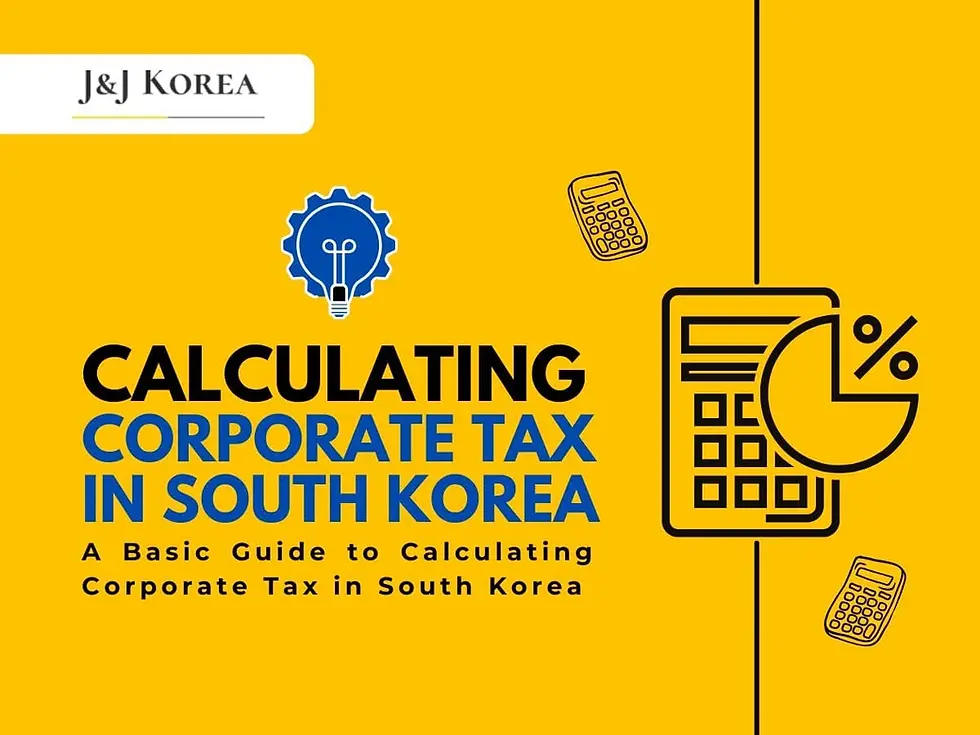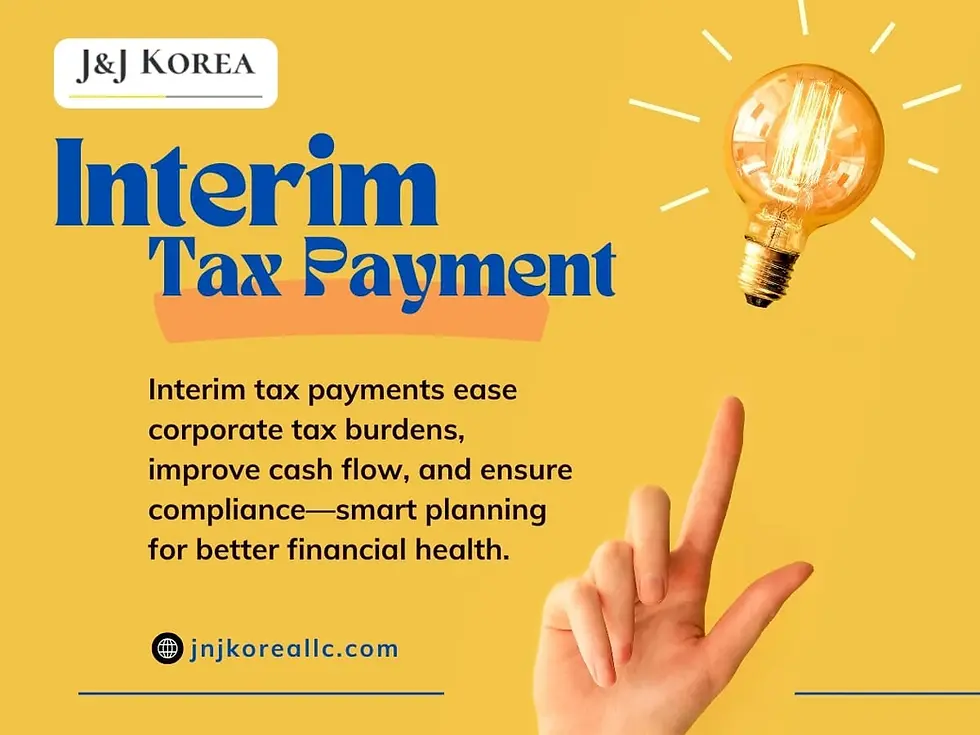Self-Employment Tax vs Employee Tax in South Korea: What to Know
- J&J Korea
- Jan 7
- 5 min read

In South Korea, whether you are a self-employed independent contractor or an employee, understanding your tax obligations is crucial.
The tax obligations and social security contributions of both kinds of workers are different.
While employees benefit from various company-provided perks, such as health insurance and paid leave, self-employed individuals have a more flexible working life but must manage their taxes and contributions independently.
This blog will break down the differences between employee tax and self-employment tax in South Korea, making it easier for you to understand which tax obligations apply to you.
Employee Taxes in South Korea
For employees working in South Korea, the tax and contribution system is relatively straightforward.
Employees can more easily complete their tax obligations because employers are in charge of withholding taxes and contributions. These taxes are generally deducted directly from their monthly salary, so employees don’t have to manage them personally.
Employee Contributions
In South Korea, employees are required to make contributions to a number of social security programs, such as Employment Insurance, National Health Insurance, and the National Pension.
Here are the main contributions:
National Pension: Employees contribute 3.92% of their monthly salary. This contribution provides retirement benefits in the future.
National Health Insurance: The contribution for health insurance is 6.86% of the salary. This program covers medical expenses for employees and their families.
Long-Term Care Insurance: Employees contribute 0.80%. This helps cover long-term care costs, such as nursing services for elderly or disabled people.
Employment Insurance: This contribution stands at 16.08%, with the rate for the employee being 0.90%. Employment insurance provides benefits if an employee loses their job.
Employee Income Tax

South Korea uses a progressive tax system, meaning that the more an employee earns, the higher the percentage of their income is taxed. The tax brackets for 2024 are as follows:
Up to 12 million KRW: 6%
12 million KRW to 46 million KRW: 15%
46 million KRW to 88 million KRW: 24%
88 million KRW to 150 million KRW: 35%
150 million KRW to 300 million KRW: 38%
300 million KRW to 500 million KRW: 40%
500 million KRW to 1 billion KRW: 42%
Above 1 billion KRW: 45%
Based on these rates, employers are in charge of deducting the appropriate amount of income tax from workers' paychecks and sending the money to the National Tax Service (NTS).
What Is an Independent Contractor in South Korea?
An individual who supplies goods or services to a customer but is not regarded as an employee of that customer is known as an independent contractor or self-employed person. Because they can choose their clients, set their fees, and set their hours, independent contractors have greater freedom in their employment.
However, they don’t receive benefits such as paid sick leave or health insurance that are typically provided to employees.
In South Korea, there is no clear legal distinction between an employee and an independent contractor, but the classification usually depends on the nature of the working relationship. Independent contractors generally:
Determine their work schedule.
Work for multiple companies or clients.
Use their tools and equipment.
Work without supervision or integration into the company.
Have the freedom to delegate or subcontract tasks.
Because independent contractors manage their business affairs, they are responsible for filing and paying taxes directly to the government.
Business Registration for Independent Contractors

You must register your company with the National Tax Service (NTS) if you wish to operate as an independent contractor in South Korea. The majority of contractors are sole owners ("sa-eob-ja"), which means they bear personal liability for the debts and taxes of the company.
If you want additional legal protection or plan to work with others, you can also form a partnership or incorporate a company. For most contractors, registering as a sole proprietor is sufficient, but you must inform the NTS about your status. Additionally, certain professions, such as medicine, law, or food handling, require specific licenses or permits.
Getting Paid as an Independent Contractor
As an independent contractor, you are responsible for invoicing your clients and collecting payments. This includes determining your rates, agreeing on terms, and following up on payments. Common payment methods include:
Bank transfers
Direct deposits
Paper checks
Digital wallets (e.g., PayPal, Wise)
Using platforms like Remote can simplify payment collection and ensure quick and efficient transactions without hidden fees.
Independent Contractor Taxes in South Korea

Tax liability is one of the main distinctions between being an independent contractor and an employee in South Korea. As an independent contractor, you are in charge of managing your own taxes and social security contributions.
What you should know is summed up here.
Taxation for Independent Contractors
Independent contractors in South Korea must file personal income taxes based on their business profits. The income tax rates range from 6% to 45%, depending on the amount of income earned. The more you earn, the higher your tax rate.
In addition to the national income tax, independent contractors must also pay local income tax, which ranges from 0.6% to 4.5%, depending on where you live.
Contributions to Social Security
Independent contractors are also required to make monthly contributions to several social security programs, including:
● National Pension: Pay into the national pension system with a portion of your earnings.
● National Health Insurance: Pay for your dependents' and your health insurance.
● Employment Insurance: Independent contractors are required to make contributions to employment insurance even though they are not eligible for unemployment compensation.
● Worker’s Accident Compensation Insurance: This covers accidents or injuries that happen while working.
Independent contractors must file their annual tax return between May 1 and May 31 each year, ensuring that they’ve reported their business income and paid the necessary taxes.
Deductible Business Expenses
The good news for independent contractors is that most business-related expenses are tax-deductible. This includes things like:
Travel expenses
Maintenance and office costs
Entertainment and meal expenses related to business activities
These deductions help reduce the amount of taxable income, which can lower your overall tax burden.
VAT for Independent Contractors
If you are an independent contractor in South Korea, you must also register for Value Added Tax (VAT) and charge your clients 10% on the services you provide. You will need to report and pay the VAT every six months. If your annual income is under ₩80 million (around $61,000), you may qualify for a reduced VAT rate of 1.5% to 4%.
How J&J Korea Can Help
It is quite complicated to navigate business taxes in South Korea on your own, especially if you are new to the landscape or independent contractors.
If you’re unsure about how to handle your taxes, social security contributions, or VAT registration, J&J Korea can provide expert guidance. We specialize in helping businesses and independent contractors navigate South Korea’s tax system, ensuring compliance and minimizing the risk of penalties.
We can help you manage your business taxes smoothly, so you can focus on growing your business without worry.




Bình luận